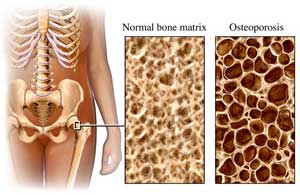The tomato pigment Lycopene in the diet has been demonstrated to be a beneficial agent in reducing age-related diseases, cardio-vascular disease and even prostate cancer. A new aspect has now been investigated.
Consuming more lycopene in the diet is of significant benefit to post-menopausal women, as it reduces oxidative stress and bone turnover. The findings come from head researcher Erin Collins from the University of Toronto. The study results also suggest, that dietary lycopene is readily absorbed, particularly in combination with vitamin C. These results are encouraging, as lycopene may be one of the main agents important for the prevention of osteoporosis.” We found that women who consumed more tomato products on a daily basis had a lower bone turnover and lower oxidative stress than women of the same age group who did not consume as much”, reports Ms. Collins. The participants of the research project were between 50 and 60 years. Lycopene levels in the blood were analyzed, and a seven-day food record was completed. The lowest quartile of estimated lycopene intake was 1.8 mg per day, and the highest was 8 mg per day. Lab tests also showed that higher levels of lycopene were associated with a lower level of protein oxidation and cross-linked N-telopeptides of type I collagen, for short NTx. The latter one is a marker of bone turnover. The intake of vitamin C appeared to work together with lycopene, but it only showed to have a correlation, if 500 mg per day or more of vitamin C was consumed. The effect was not observed among the volunteers who consumed less than 500 mg per day of vitamin C.
An intervention study will begin shortly, which will be the first of its kind. It will assess the bone parameters in women treated with different doses of lycopene pills.
It is likely that follow-up studies will confirm initial findings, and dietary lycopene could become a simple, inexpensive way of helping to prevent osteoporosis.
More information about osteoporosis: http://nethealthbook.com/arthritis/osteoporosis/
Reference: The Medical Post, October 11, 2005, page 8
Last edited October 29, 2014






